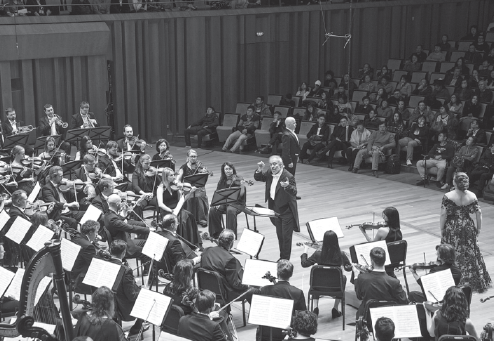When a program built around Wagner's last opera, Parsifal, was announced, conductor Valery Gergiev started to worry.
The opera, which runs for five and a half hours, premiered on July 26, 1882, at the Bayreuth Festival Theatre in Germany. Performed by Mariinsky Orchestra, it made its debut in Nanjing, Jiangsu province, on Nov 24 and the concert version was staged at the National Center for the Performing Arts in Beijing on Tuesday. In 2013, the opera was staged in China for the first time with a performance given by the China Philharmonic during the Beijing Music Festival.
"I didn't offer any specific warnings to the audience and it turned out that I didn't need to worry about anything. The audience was curious and wanted to try something new. We had great nights under the same roof and it was amazing," says Gergiev, the artistic director of the renowned Mariinsky Theatre, which is currently touring China. "Classical music is for a new generation, for a world moving on, especially the world of young people in China."
The 66-year-conductor made his remarks at the opening of the Beijing Forum for Symphonic Music 2019 held at the NCPA on Tuesday. As an old friend of the venue, Gergiev, who conducted the opening concert for the NCPA in 2007, performed with Mariinsky Orchestra at the venue from Nov 25 to Wednesday.
Initiated by the NCPA on the theme of "Integration and Development", the forum gathered about 30 orchestras and organizations together from North America, South America, Europe, the Middle East, Asia and Australia alongside more than 200 music practitioners-including the directors of world-class famous orchestras, such as the Lucerne Festival Orchestra, US Cleveland Orchestra, Mariinsky Orchestra and Wiener Symphoniker-as well as representatives of domestic orchestras, conservatories, record companies and Chinese composers.
As one of the key speakers, Wang Ning, president of the NCPA, says the aim of the forum was to ask all the pressing questions currently affecting the global classical music scene: What is the future of classical music? How can classical musicians develop new audiences, especially a younger fan base? Will classical music be able to survive in the face of the technological revolution?
What makes Wang proud, he says, is that the younger generation made up the majority of the audiences attending concerts at the NCPA. Over 200,000 people watched performances at the venue, and of the 340,000 registered members, 69 percent were under the age of 45. Onethird of the registered members are classical music fans.
"We are excited to see that this great venue, though relatively young compared to many other world famous theaters and concert halls for classical music, is inspiring a growing interest in classical music among young people," says Wang, adding that the NCPA has been making a push to get classical music out of the theater and perform in museums, galleries, subway train stations and schools-which all offer new venues to enjoy the sounds of classical music.
Technology is also helping classical music to expand its audience, Wang says. Over the past five years, the number of people watching the livestreaming NCPA performances has increased from 2.83 million to 23 million.
One of the most-watched concerts of 2019 was that of the Philadelphia Orchestra performing under the baton of its music director Yannick Nezet-Seguin on May 17 and 18, which attracted an audience of 1.2 million viewers online.
During the forum, Wang also initiated an alliance of symphonic music, which calls for the sharing of online streaming resources, recordings and to build platforms for exchanges and development in the global performing arts industry.
The importance of classical music getting out of the concert hall was noted by the speakers, which is seen as a great way of connecting classical music with a wider audience.
"In a time where arts institutions battle to sell tickets, we want to share music with people who cannot go to concert halls, such as patients in the hospitals and retired soldiers and members of the armed forces. Classical music should play its role in communities," says Gary Ginstling, executive director of the National Symphony Orchestra, a private company headquartered in Washington, DC in the United States.
The orchestra is set to tour Japan and China in spring, and Italian conductor Gianandrea Noseda, who is also the music director of the National Symphony Orchestra, will lead a complete cycle of Beethoven symphonies in May and June to celebrate the 250th anniversary of the composer's birth.
According to Jonathan McCormick, director of the Chicago Symphony Orchestra's Negaunee Music Institute, an educational and community-engagement wing of the ensemble, Chinese American cellist Yo-Yo Ma became the orchestra's creative consultant in 2009 and his work "has focused on mentoring the musicians and encouraging them to make their musical journey bigger than themselves, to get outside of the ever-solitary practice room and hone their craft, organically, in their communities".
"As Yo-Yo Ma said, 'If you want to expand your musicianship, explore your humanity'," says McCormick.

